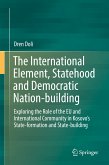The American public has become increasingly disenchanted with the United Nations. Some responsible sources in this country are already advocating withdrawal from U.N. agencies and perhaps even from the entire system. This book, by the former Director of Research at UNITAR, the U.N.'s "think tank," examines the record of the U.N. during its first 40 years in the clear light of American national interest. Franck offers a balance sheet which confirms that the U.N. during its first 40 years in the clear light of American national interest. Franck offers a balance sheet which confirms that the U.N. often operates in a way that undermines respect for individual human rights and hampers conflict resolution. At the same time, he does not shrink from showing that the fault frequently lies with the United States itself. He shows how the U.S. helped form the U.N. with unrealistic views of what it could do, how for a decade or more the U.S. was able to use the U.N. essentially as a tool and adjunct to its foreign policy, and how Washington failed to predict and plan for the inevitable shift in power at the U.N. led by the newly emergent Third World nations. Franck warns of the American penchant for treating international relations as a series of unrelated encounters instead of an ongoing, institutionalized system in which the tactics and outcome of one crisis inevitably affect the way the next context is played out. Taday the U.S. and its allies are often the butt of antagonisms that the U.N. system seems to encourage and exaggerate. Nevertheless Franck shows that even now the U.S. position in the U.N. is far from hopeless, and he provides a blueprint for a strategy of "playing hard ball," which is far more realistic than abandoning the world organization.
Dieser Download kann aus rechtlichen Gründen nur mit Rechnungsadresse in A, B, BG, CY, CZ, D, DK, EW, E, FIN, F, GR, HR, H, IRL, I, LT, L, LR, M, NL, PL, P, R, S, SLO, SK ausgeliefert werden.









